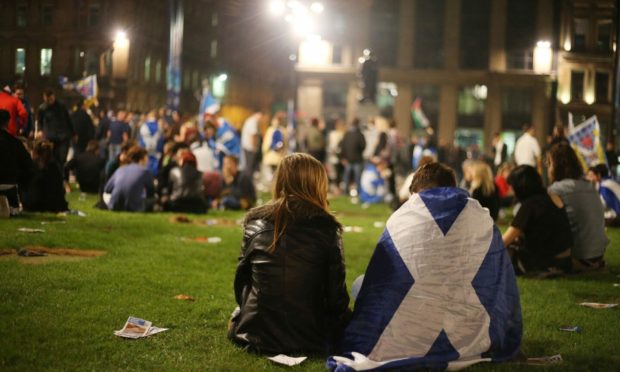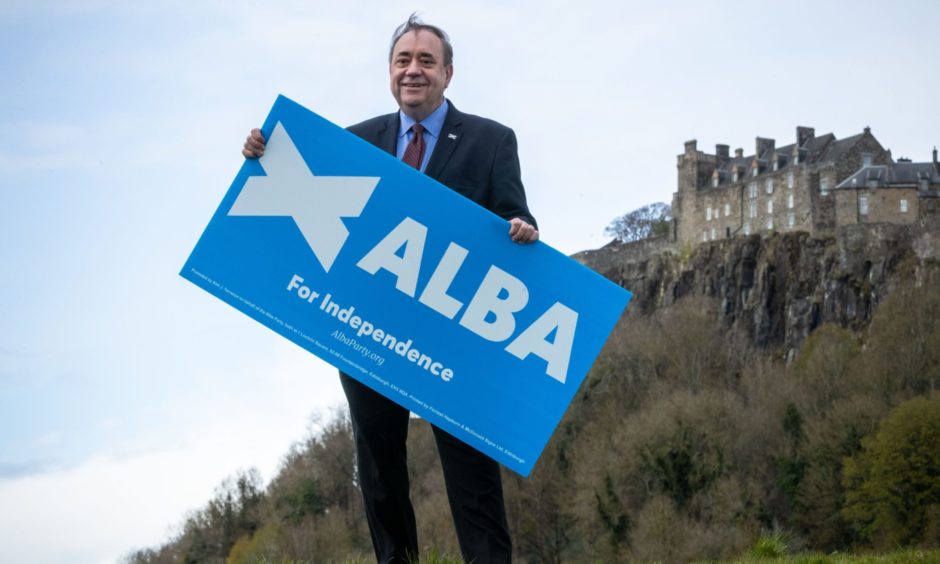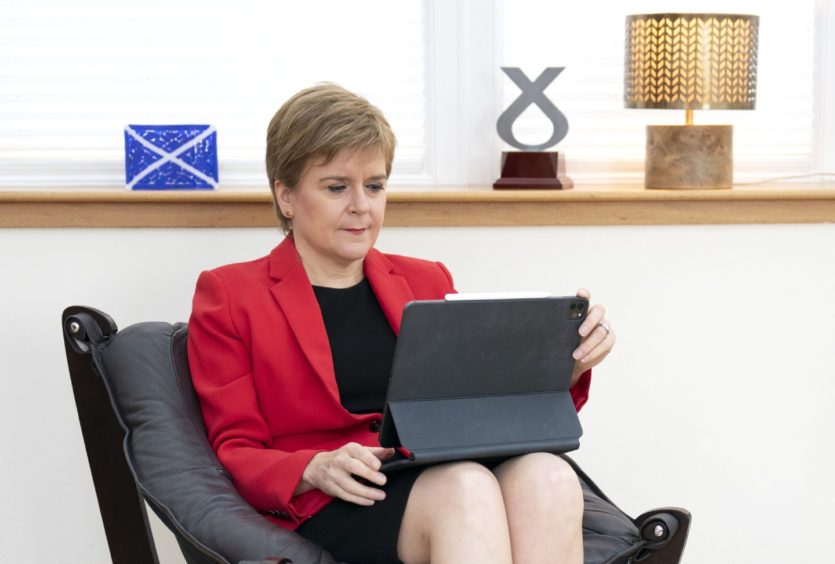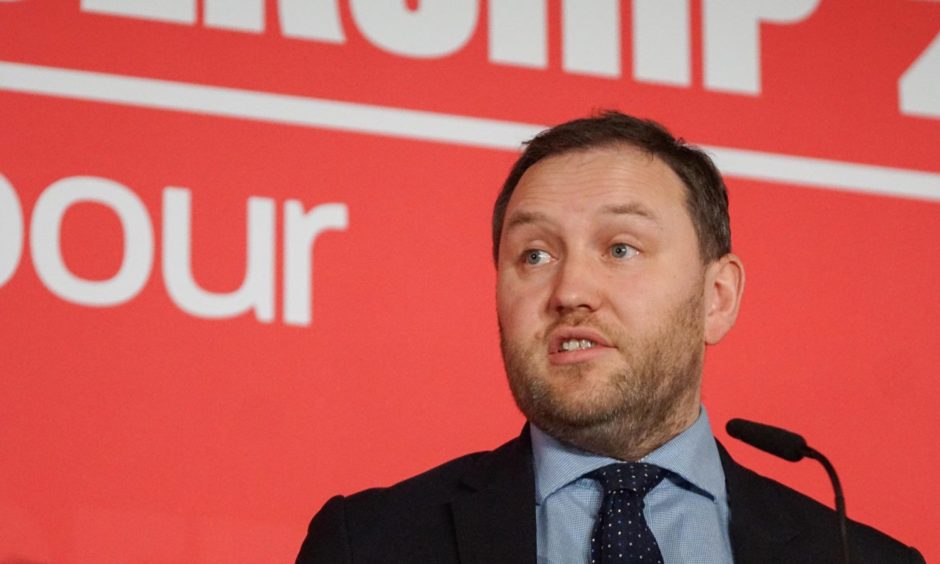SNP members have overwhelmingly backed plans to hold another independence referendum at the “earliest” opportunity after Covid, with one prominent former MSP saying a vote as early as next Autumn could be “ideal”.
Nicola Sturgeon has called for another ballot to be held by the end of 2023 if the threat from the virus is over, although the UK Government remains opposed to transferring the powers for a second referendum at any time.
Former SNP MSP Andrew Wilson, who chaired the sustainable growth commission, said he believed having a vote in either the autumn of 2022 or at some point in 2023 would be “ideal” but accepted leaving the UK “will be hard work, it will be an effort”.
‘That would be ideal’
Speaking about the possible timetable for a second independence vote, Mr Wilson told BBC Scotland’s Sunday Show: “I am not in a rapid hurry to do it tomorrow.”
But asked if he wanted such a ballot to take place by the end of 2023, as proposed by the first minister, he said: “That would be ideal.
“I think the ideal time to have a referendum would be in the autumn of next year or the year after. That would be my private, personal view.”
📣 @NicolaSturgeon: "I'm very confident that when this question is next put, people in Scotland will vote Yes.
One of the reasons is that we've seen how all of the things that were said by the No campaign in 2014 turned out to be false."
🏴 Join us: https://t.co/bkLETLnJTB pic.twitter.com/70TRxWbGwV
— Yes (@YesScot) September 12, 2021
Party members have now endorsed Ms Sturgeon’s preferred timescale, backing a motion by 535 votes to 10 that sets out plans for another vote “as soon as it is safe to hold a proper, detailed, serious national debate on independence”.
It states that the date should be determined by “data-driven criteria” about when the public health crisis is over.
Chris Hanlon, the SNP’s policy development convener, insisted the timescale for another vote was “not kicking the can down the road”, amid calls from some pro-independence supporters for another referendum as soon as possible.
Driven by data
He said: “This resolution expects our party’s leadership to consult the relevant subject matter experts to define a set of data-driven criteria.
“Once they are met, the people of Scotland can be confident that it’s safe to hold a referendum, like we did in 2014, that engages the whole population in scrutinising the proposal and has the same energy vigour and passion we saw seven years ago.”
The third day of the SNP conference, which is being held entirely virtually, risked being soured on Sunday by Alex Salmond’s breakaway Alba Party, as the former first minister announced plans to publish an alternative prospectus for independence.
Mr Salmond, who led the SNP in government before the 2014 referendum, said a “wee Alba book” written by Robin McAlpine, who was head of the pro-independence Common Weal think tank until earlier this year, will be sent to 100,000 homes.
Stuart Campbell, who writes the Wings Over Scotland blog, will also edit the pamphlet, after producing the Wee Blue Book in the run up to the 2014 independence referendum.
Mr Salmond, whose party failed to win a single seat at the Holyrood elections this year, insisted the pandemic and Brexit are “no excuse” to delay another referendum, and claimed no progress had been made by the SNP on holding a new vote.
No excuses
Appearing on Sky News’ Trevor Phillips On Sunday show, Ms Sturgeon rejected any suggestion she was using coronavirus as an excuse to delay.
She said: “This is not just about safety of polling stations, it is about making sure that as the country faces a big, important decision about its future, it’s able to focus on that properly, and that it doesn’t have looming over that a Covid crisis.”
Pointing to spiking cases, she said: “I don’t think that kind of situation would be the best backdrop to the country considering and making a decision on its future.
“I’m not going to say a precise level of infections, but you would want to see the Covid situation under control, the pressure on our National Health Service significantly lower than it is right now, a sense that we weren’t still in the acute phase of this crisis.
“But also crucially, and I think this is crucial, a sort of overall environment in the country where people are not, in their day-to-day lives, being asked to even, if not comply with legal restrictions still, limit or restrict their own day-to-day behaviour.”
Broken promises
Labour’s shadow Scotland secretary Ian Murray insisted that for most people holding another referendum “is the last thing on their mind”.
“The SNP were all too aware this during the election, which is why they promised to focus on recovery,” he said.
“They’ve broken that promise. It’s time for them to stop talking to themselves about their separatist obsession and get on with the job they were actually elected to do.”
Scotland’s health secretary, Humza Yousaf, used his appearance at the conference to argue independence would protect the Scottish NHS from “the worst intentions of a Tory government desperate to do trade deals”.
Mr Yousaf told delegates the Conservative government would “sell out the NHS at the first chance they got” as they seek to strike post-Brexit trade deals, and suggested UK ministers could seek to interfere with health services in Scotland.
“If we are truly going to protect our NHS from the worst intentions of a Tory government desperate to do trade deals, then there is only one solution – we need independence,” he said.
“We need independence to ensure that never again can the actions of a Tory government – that we did not vote for – jeopardise our NHS. That’s why we will give Scotland the choice of independence.”
Disappointed but not surprised
Responding to the speech, Scottish Conservative health and social care spokeswoman Annie Wells said anyone in Scotland’s NHS looking for leadership from Humza Yousaf “will have been sorely disappointed — but not surprised”.
“Humza Yousaf and the nationalist coalition of chaos have no interest in the NHS recovery from Covid,” she said.
Meanwhile, delegates backed conference resolutions for Trident to be removed from Scotland within three years of independence and urging MSPs to drop plans to make the Scottish Parliament a protected site over fears it could “limit peaceful protest”.



